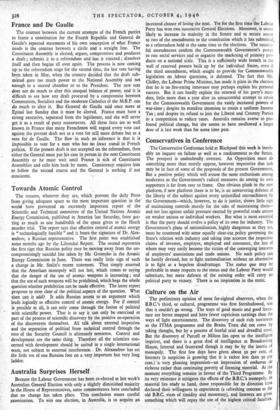Australia Surprises Herself
Because the Labour Government has been re-elected at last week's Australian General Election with only a slightly diminished majority in the House of Representatives, some commentators have concluded that no change has taken place. This conclusion wants careful examination. To win one election, in Australia, is to acquire an increased chance of losing the next. Yet for the first time the Labour Party has won two successive General Elections. Moreover, it seems likely to increase its majority in the Senate and to secure assent to two of the amendments to the constitution which it has submitted , to a referendum held at the same time as the elections. The success- ful amendments confirm the Commonwealth Government's power to run social services and to organise the marketing of primary pro- ducts on a national scale. This is a sufficiently wide breach in the wall of reserved powers built up by the individual States, even if the third amendment, which sought to provide for Commonwealth legislation on labour questions, is defeated. The fact that Mr. Chifley, the Labour Prime Minister, has made it plain in the election that he is no fire-eating innovator may perhaps explain his personal success. But it can hardly explain the renewal of his party's man- date, little more than a year after its unsuccessful attempt to retain for the Commonwealth Government the vastly increased powers of war-time ; despite its manifest intention to retain a uniform Income Tax ; and despite its refusal to join the Liberal and Country Parties in a competition to reduce taxes. Australia remains averse to pro- found political change, but she seems to have swallowed a larger dose of it last week than for some time past.






























 Previous page
Previous page